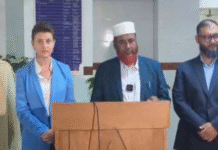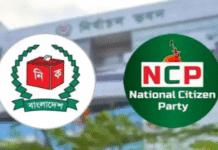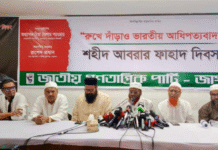TBS

The sharp divisions among major political parties, including the BNP, Jamaat-e-Islami, and the NCP, revealed during discussions with the National Consensus Commission, show how difficult it is for the commission to find common ground in our political landscape.
Except for agreeing on the establishment of an upper house in parliament, they remained divided on issues such as a two-term limit for prime ministers, the formation of a constitutional council, and the fundamental principles of the constitution.
Differences in their stances were also evident on issues such as voting methods, the duration of parliament, and the minimum age for voters and candidates.
Jamaat and the NCP propose that no individual should serve as prime minister more than twice in their lifetime. In contrast, the BNP suggests that a person may serve a third term as prime minister after a break, but not for three consecutive terms.
“A prime minister may serve two terms totalling 10 years, but cannot continue beyond that,” said Jamaat Nayeb-e-Ameer Syed Abdullah Muhammad Taher after the discussion with the commission.
BNP Standing Committee member Salahuddin Ahmed said an individual could serve more than two terms as prime minister if there is a break between the two terms.
The Jamaat-e-Islami also advocates for elections under a proportional representation (PR) system, whereas the BNP prefers to maintain the current voting method. Meanwhile, the BNP opposes the formation of a National Constitutional Council (NCC), although Jamaat and the NCP support it.
Ali Riaz, vice-chairman of the commission, declined to comment on the matter. “Since discussions with parties are still ongoing, making any definitive comment at this stage could lead to misunderstandings or confusion,” he told The Business Standard yesterday.
Unity on forming upper house of parliament
The National Consensus Commission has so far held discussions with 17 political parties. Fourteen parties, including the BNP, Jamaat and the NCP, have recommended the formation of an upper house in the parliament.
Although both the commission and the parties have agreed on the need for an upper house, decisions regarding its name, composition, term length, and responsibilities remain unresolved. The commission is continuing its dialogue with the political parties on these issues.
The BNP and the reform commission have proposed naming the upper house the “Senate”. Jamaat has not suggested a name, while the NCP has proposed calling it the “Jatiya Parishad”.
Following discussions with the commission, BNP Standing Committee member Salahuddin Ahmed said that the upper house could have 100 seats, although the commission has proposed 105.
“Regarding the election method for the upper house, who will be eligible, and whether seats will be allocated proportionally – we suggested that the constitutional amendment to introduce a bicameral parliament should first be passed. Once the bicameral system is established, the election process can be finalised through further discussions in the parliament,” he said.
Meanwhile, Jamaat Nayeb-e-Ameer Syed Abdullah Muhammad Taher said, “We have agreed on establishing a bicameral parliament. However, discussions are still ongoing regarding its size, structure, and procedures.”
What the parties’ recommend on upper house
The BNP proposed that the upper house of the parliament should have at least 50 seats, with members elected similarly to the current system for reserved women members. It recommended that bills passed by the lower house be sent to the upper house for review, with the possibility of returning them with or without recommendations. The BNP also suggested that members serve only one term in the upper house.
Jamaat-e-Islami proposed an upper house with 151 seats, including retired judges, top court officials, bureaucrats, and experts in various fields, with nominations open for further discussion.
The NCP proposed that the upper house operate under the president, and if it rejects a bill three times, it should go to a referendum. It also recommended a four-year term for both houses and the reservation of 33 seats for professionals, workers, and marginalised communities.
The Revolutionary Workers Party of Bangladesh recommended 150 members for the upper house and the introduction of proportional representation alongside direct elections. The Jatiya Samajtantrik Dal proposed an upper house with 200 members.
Recommendations of Constitutional Reform Commission
The commission recommended that the upper house have 105 seats with a four-year term, the same as the lower house. If the lower house is dissolved, the upper house would also be dissolved.
Political parties would nominate 100 candidates for the Senate based on proportional representation. The upper house would not have the power to initiate legislation, but all bills passed by the lower house, except for the finance bill, would be sent to the upper house for review.
The upper house could approve or reject bills but cannot permanently block them. If a bill is held for more than two months, it would be automatically approved.
Jamaat, NCP wants National Constitutional Council, BNP says no
Both Jamaat-e-Islami and the NCP have agreed on the formation of the National Constitutional Council (NCC), while the BNP holds an opposing stance.
“In the proposal for its [NCC] formation, we have suggested excluding the president and the chief justice from the council,” said Jamaat Nayeb-e-Ameer Syed Abdullah Mohammad Taher.
NCP Convener Nahid Islam stated, “The NCC will be responsible for appointing key constitutional positions.”
In contrast, BNP’s Salahuddin Ahmed remarked, “There is no need to form a National Constitutional Council for appointing positions such as the chief of the armed forces, the Anti-Corruption Commission, and the Election Commission.”
Disagreements over fundamental principles of constitution
Salahuddin Ahmed told reporters that the clauses in the constitution defining the fundamental principles of nationalism, socialism, democracy, and secularism should be restored to their pre-15th Amendment position.
“It would not be appropriate to equate the Liberation War of 1971 with the mass uprising of 2024,” he said.
He added, “The most crucial part of the constitution is the preamble. The commission has proposed a complete overhaul or amendment, which we do not find suitable.”
On the other hand, the NCP argued that there is no need of the fundamental principles in the constitution.
Nahid Islam told reporters, “We supported the proposal to abolish four of these principles and have requested further clarification or definition on the issue of pluralism.”
He added, “We have also demanded the cancellation of the party-based principles introduced through the 1972 principles and subsequent amendments.”
Jamaat’s Syed Abdullah Mohammad Taher said, “Pluralism should be entirely removed. We have proposed that the constitution reaffirm full trust and faith in Allah.”
Differences on voting method
Abdullah Mohammad Taher mentioned the use of the proportional representation system in elections, stating that it would help eliminate corruption, manipulation, rigged elections, and the influence of money. He noted that around 60 countries worldwide use this system.
On the other hand, the BNP supports the current electoral system. The NCP has not yet provided a clear stance on this matter.
Term length of parliament
The NCP has proposed that both the prime minister and the president should serve a term of 4 years, a recommendation also supported by the Constitutional Reform Commission. However, the BNP and Jamaat-e-Islami have opposed this, insisting that the terms for both the prime minister and the president should remain at 5 years.









